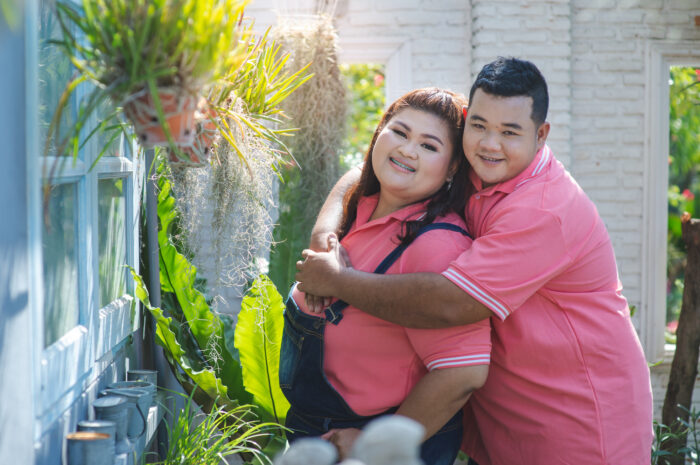
On Valentine’s Day, there can be something oddly romantic and nostalgic about a Hallmark movie, pink and red decorations, and heart-shaped candy with sweet messages of love. But for people living with obesity, February 14 can be one of the toughest days of the year.
That’s because Valentine’s Day isn’t just about heart-shaped balloons, it’s often associated with things that people living with obesity may feel insecure about: eating junk food, eating out at restaurants, dating, relationships, and the pressure to look and feel your best.
That’s why we feel it’s important to celebrate what Valentine’s should really be about: love, in all its forms.
If we allow love to guide our thoughts and feelings this Valentine’s Day, we can hopefully avoid the negativity and triggers that often come along with it. Below are a few strategies to consider this V-Day to help you keep the day in perspective and remember that loving ourselves should always be a priority.
Take time to practice self care
Your relationship status should have no bearing on how you treat yourself. So, no matter your plans this Valentine’s, there’s no reason at least a little of it can’t be just for you.
Now, self-care can mean a lot of things. It can mean pampering yourself with a long bath or a pedicure. It can mean treating yourself to a massage. Self-care can be as simple as taking some time to relax, recharge and reduce your stress level by doing anything that makes you feel good.
Taking care of our physical health is also an important part of self-care. Any sort of movement is good for our body, so whether it’s a walk or workout, it’s bound to help you both mentally and physically.
If Valentine’s Day is all about love, then we should be showing ourselves some love, in whatever form it may take.
Be intentional with your diet
Food is a big part of Valentine’s Day and one of the hardest parts of the holiday to navigate for people living with obesity.
But no matter what your plans are, it’s important to be intentional with how you’re eating on V-Day. As we have mentioned with Christmas, Thanksgiving, and other food-centric holidays, making food the enemy, and denying yourself a craving is not helpful to your weight loss journey. The result is either feeling bad about the fact that we missed out or scrapping the plan and indulging anyway. And that never feels good.
You are an adult, so if you want to eat a piece of cake or some chocolate on Valentine’s Day, you can. But if we reframe our thinking around decedent foods, it can be a lot easier to say no, or yes, without feeling shame around our decision.
Saying “no” to having a big dessert because we love our body and want to help nourish it and protect it is much easier for our mind to accept than simply saying no because “that food is bad for me.”
It can also help to realize that there really isn’t anything special about the chocolates on V-Day versus any other day. Building up these foods in our mind “because it’s Valentine’s” creates a feeling of scarcity, making the food feel more special. But in reality, you can have sweets any time you want, and there’s no reason to hype it up because of the day on the calendar.
Valentine’s Day can also be an emotional time for a lot of people, and those emotions can directly impact how we’re eating. The problem is, emotional eating can be bad for our cardiovascular health, so it’s very important to try and regulate our emotions with things like self-care to try and remove the emotion from our diet.
Take time to focus on your mental health and do things to help centre and focus your mind to avoid emotions from guiding your food choices.
Take care of your loved ones too
It can be very hard to care for another if you aren’t loving yourself. That’s why self-care and making sure to tend to your own needs is crucial. But it’s also important to reach out to loved ones on Valentine’s Day and check in with their needs.
If you’re in a relationship, take the time to check in with your partner on their mental and physical health. Your partner is heavily invested in your weight management journey as you would be in theirs, and there is evidence suggesting couples who work together as a team on common health goals can not only be successful but deepen their relationship.
It can really help your own journey to make sure your partner is well, and that you’re working in tandem on a health-related goal.
But this type of teamwork is not limited to people in relationships. It can be extremely helpful to have a friend or other family member along with you on your health journey. Whether it’s someone experiencing obesity or not, or someone there simply for emotional or physical support, having people around you who you trust and rely on is crucial.
Check in on those people this Valentine’s Day and do something fun together. Investing in the well-being of your loved ones is mutually beneficial.
Avoid negative triggers
It can be very difficult to avoid the inevitable onslaught of Valentine’s Instagram posts and practically every store is begging you to buy something heart shaped. But avoiding triggering and negative thoughts can help you get through the day a little easier.
Play happy music, call someone you care about, meditate, or limit time looking at your phone (which is probably a good habit anyway).
Do things to nourish your body and mind so you can avoid the negativity that always seems to follow this holiday around.
Somewhere along the line, we lost the plot on what Valentine’s Day is, and what it should be about. Loving a partner, loving a friend, loving yourself. It should be about love, and not much else.